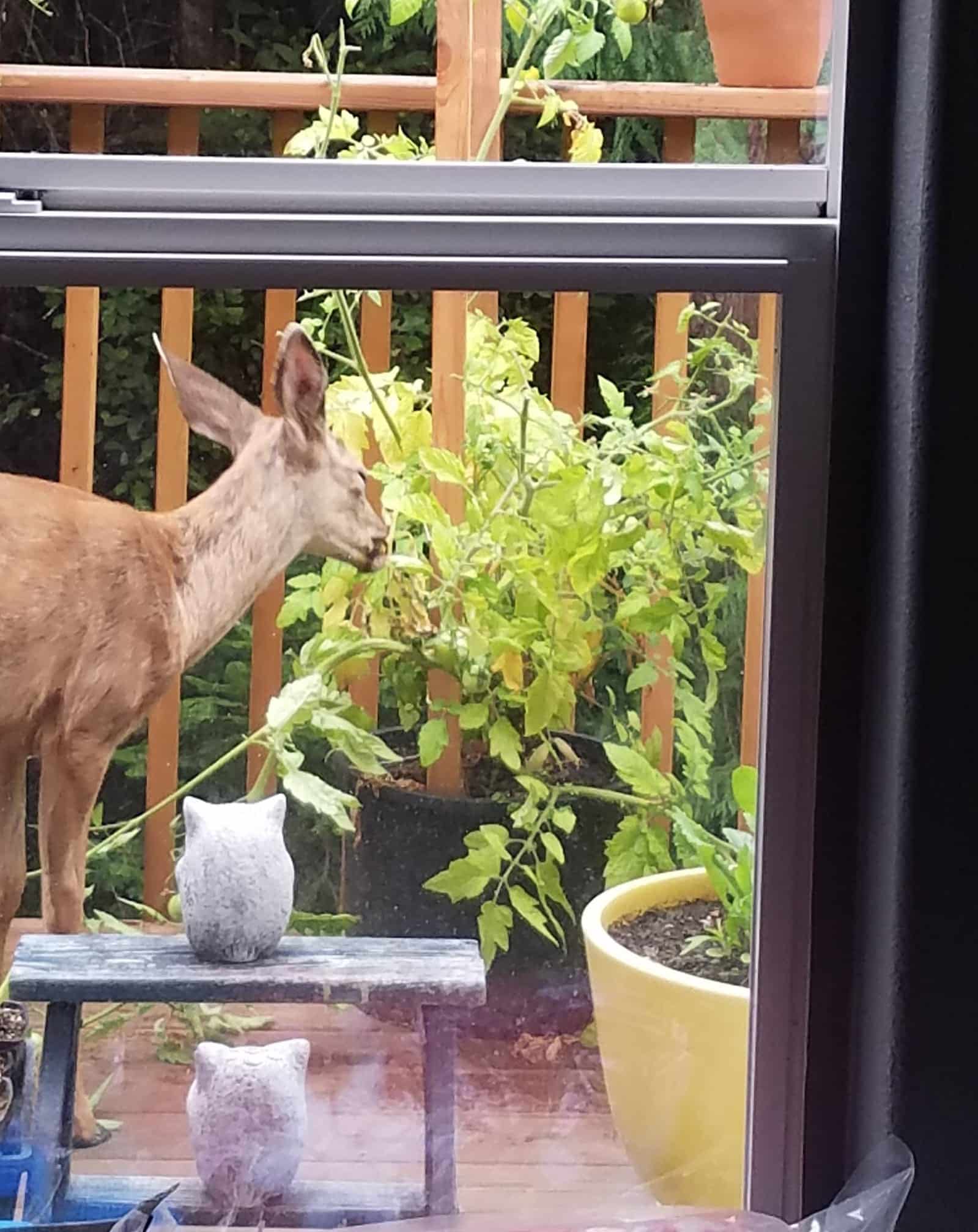Juicy tomato fruits are delicious with appealing flavors that even animals like deer cannot resist.
Deer are uncommon garden predators, and deterring them may require one or more combinations of preventive methods.
Table of Contents Show
Do Deer Eat Tomato Plants or Fruits?
Deer are opportunist feeders, munching on anything edible, and tomatoes grown in household gardens are often their easiest target.

Remember, radiant tomato fruits appeal to herbivores like deer because they are a quick source of nutrition, natural sugar, and glutamic acid with a savory, tangy flavor.
Additionally, tomato leaves and stems contain a lot of water, which is vital for animals living in less vegetated US regions like Texas, Nevada, and Utah.
So while tomatoes may not be their first food choice, they may still be willing to eat them if hungry.
Is Tomato Plant Toxic to Deer?
Tomatoes are the least deer-resistant plants that are not toxic to deer or any other significant invaders.
Therefore, overeating tomato plants will automatically deter large predators like deer.
How to Identify Deer Damage in Your Tomato Garden?
Deer damage on tomatoes leaves many telltale signs, including the following listed below.
| Damage | Signs |
|---|---|
| Browsing | Ragged edges or completely stripped foliage left due to bite marks |
| Trampling | Crushing or breaking of stems and leaves while walking or lying down |
| Chomping | Partially eaten or completely missing fruits |
| Others | Hoof prints, droppings, or tracks |
Do Deer Eat Old Tomatoes? Will Tomatoes Regrow After Being Eaten?
Deers mostly prefer young, ripened fruits, but they may eat old tomatoes if available.
You may consider removing any overripe or damaged fruit from your garden to discourage deer from feeding on them.
Tomato plants can regrow new foliage and continue producing fruit even after some physical damage.
However, the amount salvaged will depend on the amount of plant being eaten and how early or late in the season the damage occurs.
Hence, you can encourage watering and fertilizer application to your tomato plants for regrowth.
Also, remember to remove any damaged or dead parts to prevent possible disease infestation.
How to Keep Deer Away from Tomatoes?
Deterring large predators like deer can be difficult because of their sheer size and rambunctious habit of entering prohibited areas.
However, some proven ways or combinations of methods exist to deter and prevent future deer infestation in your tomato garden.
1. Use Deer-resistant Plants
The best biological method to resist deer from walking into your garden is to fortify it with deer-resistant plants.
The most popular choices of deer-resistant annuals and perennials include as follows.
| Perennials | Annuals |
|---|---|
| Floss Flower | Lavender |
| Polka Dot Plant | Sages |
| Dusty Miller | Peonies |
| Wax Begonia | Bearded Irises |
| Sweet Alyssum | Bee Balm |
| Sweet Basil | Allium |
| Spider Flower | Kniphofia (Red Hot Poker) |
| Cosmos | Achillea (Yarrow) |
| Mexican Sunflower | Anemone |
| Mexican Marigold | Aconitum (Monkshood) |
2. Install Fences
Fencing is another popular yet proven method to permanently keep deer away from your tomato garden.
The tall fence will prevent deer from jumping over; besides, sturdy metal will prevent breakage.
3. Using Repellents
Consider using natural or commercial repellents if you are not up for adding fences or growing deer-resistant plants.
The repellants are specially formulated to keep large predators like deer away from your tomatoes.
Some standard options include human hair or garlic and cayenne pepper.
Sprinkle them around the plants or hang them in bags near the garden to deter deer.
Otherwise, use electronic repellents with scents and sounds to discourage deer from entering your garden.
4. Use Netting
Cover your tomato plants with netting such as trellis mesh to prevent deer from accessing the tomatoes.
Moreover, lock the net ends to the ground to prevent deer from pulling it away from the plants.

5. Scare Tactics
Use scare tactics, such as fake predators, shiny objects, or noise-making devices to prevent deer from walking in.
Alternatively, you can use motion-activated sprinklers. When the device detects motion, it will activate, startling the deer and causing them to flee.
These scare tactics help prevent deer from entering your garden and make them think twice before coming back to your garden.
6. Habitat Modification
If possible, you can modify the habitat around your garden to make it less attractive to deer.
It includes removing the cover, such as tall grass and shrubs, and limiting food sources in the area, such as ornamental plants and fruit trees.
Otherwise, consider growing your tomatoes on a raised level, such as a pea gravel patio or terrace, to keep them away from the deer’s vision.
From Editorial Team
Conclusion!
Use any of the above-mentioned methods or a combination of two or more techniques to successfully deter deer from tomato gardens.
Similarly, grow other vegetables, fruits, and green shrubs away from accessible garden spots to prevent inviting deer inside.


